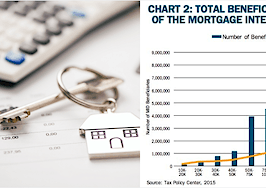- DACA allowed undocumented immigrants who were brought to the U.S. as children to apply for temporary legal status in two-year increments.
- Almost a quarter of DACA recipients over 25 years old own a home, and 97 percent have jobs or are in school.
- Trump's repeal could have repercussions for DACA homeowners and employment across industries.
There are about 800,000 “Dreamers” in the United States — undocumented immigrants who were brought to the country as children. They have jobs, own homes and are enrolled in colleges and universities.
The Deferred Action for Childhood Arrivals (DACA) protections gave these immigrants the opportunity to apply for temporary legal status in two-year increments. However, after President Trump’s decision to cease DACA, if Congress doesn’t pass new legislation by March 2018, those 800,000 people will be subject to deportation.
What effect could this have on the real estate industry?
How DACA recipients contribute to the economy
The most recent research on how DACA recipients interact with the job market and overall economy was conducted by left-leaning advocacy group Center for American Progress by Tom K. Wong, an associate professor of political science at the University of California – San Diego.
Wong and partner organizations recruited DACA recipients via their own networks and Facebook ads, asking migratory history questions in the survey to confirm undocumented status. They received 3,063 valid responses.
The median age of survey respondents was 25 years old, and the median age at which they were brought to the U.S. was 6 years old. About 93 percent identified as Hispanic, while 3.5 percent identified as Asian or Pacific Islander and 1.7 percent identified as white.
According to this research, 15.7 percent of DACA recipients bought their first home after their DACA applications were approved. Among respondents who were older than 25, the share of post-DACA first-time homebuyers increased to 23.5 percent.
Respondents also said they achieved other milestones after their DACA applications were approved:
- 54.2 percent got their first job
- 64.5 percent bought their first car
- 65.3 percent “pursued educational opportunities that I previously could not”
- 5.4 percent started their own business.
DACA recipients are also fairly well-educated — 28.2 percent have a bachelor’s degree or higher. Ninety-seven percent of them either have a job or are in school (or both).
The researchers also asked respondents with jobs whether their employers were aware that they had DACA status. Half said “yes,” 11.4 percent said “no” and 37.7 percent said “not applicable.”
Where do DACA recipients live?
Department of Homeland Security reports indicate that most approved DACA recipients (about one-quarter — 200,000) are in California.
Texas has the next-largest population of approved DACA recipients, with about 110,000.
After that, the top states with approved DACA recipients (numbers are approximate) is as follows:
- New York (54,000)
- Florida (42,000)
- Illinois (37,000)
- New Jersey (25,000)
- Arizona (24,000)
- North Carolina (22,000)
- Georgia (22,000)
- Washington (16,000)
So what does it mean?
There are two ways that these changes could impact the real estate industry.
The most obvious involves DACA homeowners. Depending on the solution (or lack thereof) that Congress is able to finesse, there may be a group of homeowners who are thinking about selling and moving in March 2018.
There’s no data on how DACA homeownership breaks down by state, but given the preponderance of DACA recipients in California and Texas, there are likely DACA recipient homeowners in those states who are nervous about their assets and unsure of what the future holds.
The National Fair Housing Alliance (NFHA) spoke out against the repeal, stating that DACA “provided hope for nearly 1 million young undocumented immigrants whose dreams of a better and successful future reflect the spirit and hope that has defined the United States of America.”
NFHA added: “The Fair Housing Act protects people from discrimination regardless of the status of their national origin, which may impact citizenship standards, and the Civil Rights Act of 1866 states that all people of the United States have an equal right to make and enforce contracts, including those to secure housing.
“Fair housing advocates stand at the ready to protect the fair housing rights of all people in the United States and we urge Congress to take steps to pass legislation to protect Dreamers.”
In addition, there’s the potential impact on labor. The Pew Research Center has reported on the declining number of undocumented workers in the construction industry in recent years. Because DACA recipients receive temporary (but renewable) legal status, it’s possible that this decline can be at least somewhat attributed to the access to legal status that DACA provided for undocumented workers — but no research exists that specifically outlines the share of DACA recipients working in the construction industry.
That said, the construction industry has also been facing a dearth of skilled workers in recent years. It will remain to be seen what effect the repeal of DACA will have on the construction sector in particular — but in a time when most markets are feeling an inventory pinch, it’s highly possible that a lack of workers to build new construction is going to make inventory problems more acute.
“DACA recipients represent the best of America,” said John Graff, a broker-owner in Los Angeles, via email. “These young people were brought here as little kids, unaware of the risks their parents were taking in hopes of giving them a brighter future. Now as adults DACA recipients are learning, working, and contributing to society at astonishing rates. After spending years educating and integrating these 21st century American immigrants, sending them back to a foreign land wouldn’t just be cruel, it would be a missed opportunity to have a cohort of hard-working, learned, civic-minded taxpayers adding to our nation’s productivity.”
And real estate professionals might not always be documented, either. California associate broker Carmen Martinez shared her story with Inman via email:
“On Labor Day 1982, my parents brought my siblings and I into the U.S. on visitor’s visas. We packed a couple of changes of clothes and I brought my stuffed homemade bunny. I had turned 13 not quite three months before.
“In 1986 I went to get a job for a company called Kennedy; they made those huge computer tapes for the government. The HR lady asked me for my birth certificate, which I happily brought her. She was surprised it was a Mexican birth certificate, so she asked me for my Green Card. I went home and asked my mom for it and that is when I found out I was undocumented. I still got the job.
“I had talent as an artist and the School of the Art Institute of Chicago (SAIC) sent me an invitation to apply, along with a couple of other colleges. I saved those invitations along with my diplomas and achievements from high school. I dreamed of a college education but knew that as an undocumented person, it was a pipe dream.
“Those few years when I knew I was undocumented were very traumatic. I went back to Mexico in 1987 as Kennedy Co was sold and HR had to disclose my status. I spent two years in Guadalajara with my dad’s side of the family, whom I adore. But I didn’t understand the system. I felt like a foreigner. Eventually, I came back for my sister’s wedding and this time I crossed illegally as an adult. I came home.
“I was fortunate to fall in love with an American citizen and in 1993 we traveled to Ciudad Juárez to get my passport stamped, giving me the right to cross legally and become a resident alien.
“As a proud American citizen, I now have an AS in business and a BS in organizational leadership.
“The most amazing thing? My oldest daughter is a student at SAIC — yes, that school that invited me to apply. It was totally serendipitous and we didn’t make the connection until after she started attending.
“Today, my heart breaks about all these DREAMers. Taking away DACA will impact more than the homes they own. Some of these people are not only homeowners, but are the parents of American citizens. Will these children also be penalized for their grandparents wanting them to have a better life? Where does it stop?”





